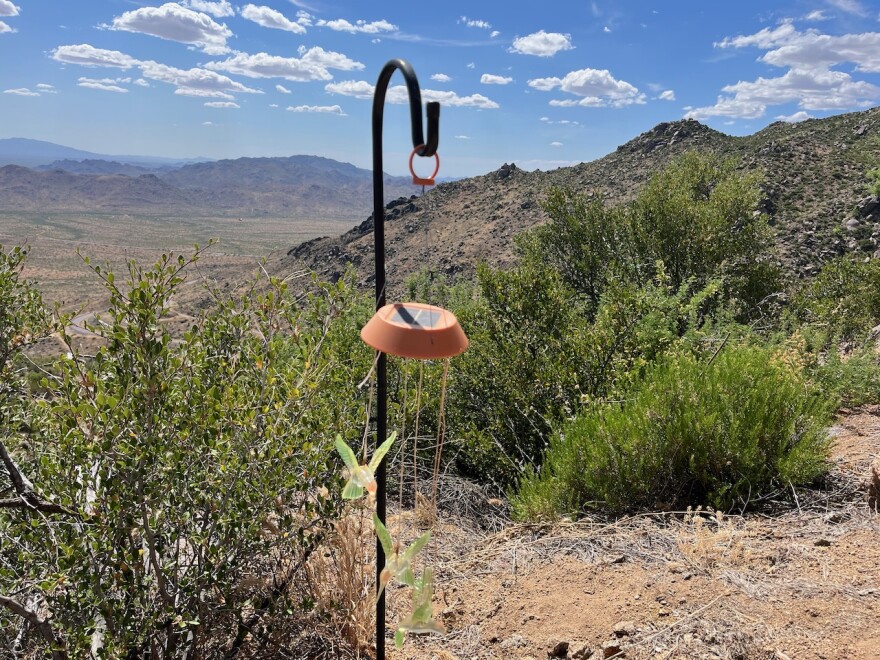Today marks the 10th anniversary of one of the grimmest days in wildland firefighting history—when 19 members of the Granite Mountain Hotshots died fighting the Yarnell Hill Fire. Only one crew member survived. The news was unbearable; the magnitude of it nearly impossible to absorb. Those closest to the fallen firefighters will reckon with it for the rest of their lives. For some, the last decade has been about confronting deep PTSD and focusing on mental health. We start this remembrance along the trail of the hotshots’ memorial in the desert near Yarnell, the site of the crew’s final call.

It's a warm June afternoon at the Granite Mountain Hotshots Memorial State Park just south of Yarnell. I’m the only person on this surprisingly steep trail that winds its way up nearly three miles of rugged high desert. It’s hauntingly quiet in this unforgiving landscape.
Spread periodically along the craggy switchbacks are individual memorials and plaques to each of the fallen firefighters. The first is to Eric Marsh, the superintendent of the crew and the father figure of the Granite Mountain Hotshots. Even on this 80-degree day, it’s hard to imagine firefighting in this harsh environment as they did nearly 10 years ago when temperatures neared 100.

Every so often, I see little mementos people have left—painted rocks, little American flags and wind chimes with small plastic hummingbirds clinking in the breeze. It all imparts a sense of sacredness to the area, knowing that one of the most shocking tragedies in all of American firefighting occurred just over the next ridge.
On my way back down to the trailhead I meet Charlie Julg, a retiree from Sun City. He’s just getting ready to set out on the hike in the midday heat.
“I want to go over the ridge and look down and think, what were these gentlemen experiencing. God bless ‘em. Every one of them,” he says.

Like many people, Julg was captivated by the story. He’s here today after reading a book written by Brendan McDonough, the sole surviving Granite Mountain Hotshot.
“Mr. McDonough, I can only imagine what he’s going through. These gentlemen, they’re heroes in the true sense of the word,” says Julg.
McDonough is the only direct link to the events of June 30, 2013. In the aftermath of the incident, overcome by grief and survivor’s guilt, he found himself at the center of a maelstrom of international attention.
“For so long, I thought the man that I was June 29, 2013, would never come back again and I would never be better than that person,” says McDonough. “I didn’t think it was OK to be happy and enjoy life because they weren’t here to live it and that was tough. That was tough for a while."
For years after Yarnell Hill, McDonough struggled with PTSD and alcoholism. And it was through therapy and faith that he learned how to cope with the experience and move forward.
“Sometimes trauma keeps us stuck, loss and grief keeps us stuck,” he says. “We need help, we can’t do this on our own and the expectation to do it on your own is unrealistic when we face hard, difficult times.”
In the dark days following the Yarnell Hill Fire, Prescott Fire Captain Dan Bauman was assigned as the official liaison for McDonough, often talking on the phone late into the night. I catch up with him at a firehouse near the Prescott airport.
“Obviously, he was going through so much. He lost his 19 closest friends. When you’re on a crew like that you’re almost family, like brothers,” says Bauman.

Bauman, a former member of the crew, was on duty that day when the terrible news came over the radio. He and several others would be tasked with the grim job of recovering their colleagues’ remains.
“Ten years later it’s still just shocking to me. It was hard to even take in,” he says, “I’ve suffered significant PTSD from the incident ever since then. It took me a while to acknowledge or recognize it.”

Like McDonough, Bauman eventually sought therapy and says the fact that he can even talk about the incident is a tribute to years of hard work.
“It’s an active process of staying healthy, talking about things. Still even 10 years later, there’s almost not a day that goes by that I don’t think about the crew, or a member of the crew, or it doesn’t have some impact on me,” he says.
Both Bauman and McDonough agree that prioritizing mental health is paramount in the firefighting world, especially in the wake of unspeakable tragedies like the loss of the Granite Mountain Hotshots. McDonough says it’s helped him get to a much better place.
“As I approach the 10-year, just a lot of gratitude for the life that I live today,” he says. “There’s certain emotions or certain feelings or memories that just sometimes don’t lose their sting. And I think the difference is, as years have gone on, is I’ve learned how to cope with that and deal with it better. It’s been a cathartic process through learning about my trauma.”
The tragedy of the Granite Mountain Hotshots is imprinted on the DNA not only of the Prescott and firefighting communities, but also on the world that so often looks to firefighters to be larger-than-life heroes. And there’s still a lifetime’s worth of coming to terms with that day in Yarnell that lies ahead.



